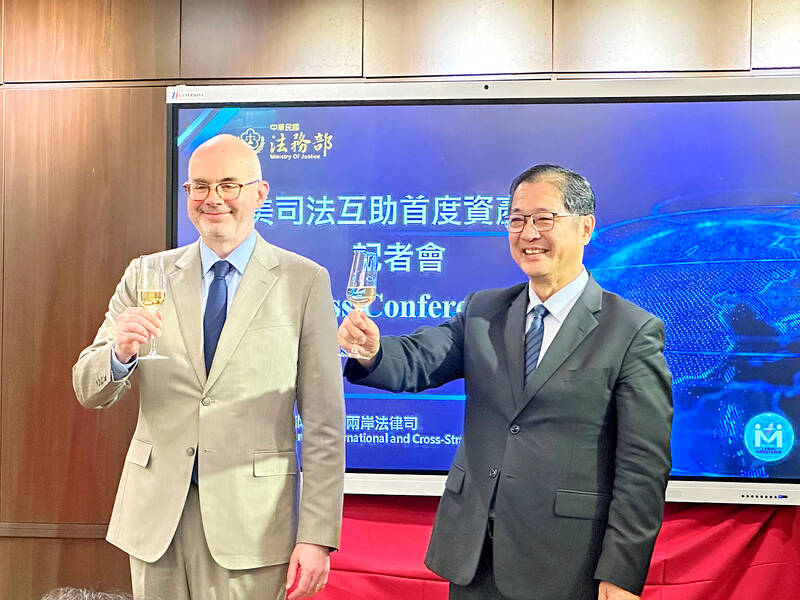Minister of Justice Cheng Ming-chien (鄭銘謙) on Thursday lauded the cooperation between Taiwan and the US to bring to justice a Taiwanese company engaged in international money laundering, with the two nations for the first time sharing the assets seized from the case.
Cheng was joined by American Institute in Taiwan (AIT) Director Raymond Greene, along with other US officials, at a news conference at the Ministry of Justice in Taipei to provide details of the investigation to track the money flow, mainly from drug trafficking, between Taiwan and the US.
Officers at US Homeland Security Investigations (HSI) headed the initial investigation after detecting unusual banking transactions at a company called “LA Idols,” which was set up by a Taiwanese-American woman surnamed Yeh (葉) in Los Angeles to deal in international trade.

Photo: CNA
The HSI office in Los Angeles found that between 2013 and 2014, Yeh had transferred about US$27 million to her bank accounts in Taiwan and had bought some properties in the US.
A follow-up investigation led to a series of raids in September 2014, with investigators seizing financial records, her assets in the US and other evidence, said Brian Sherota, representing the HSI office at AIT in Taipei.
The US investigation found that LA Idols engaged in complex trading activities and fraudulent accounting to launder profits from drug trafficking, Sherota said.
US investigators seized Yeh’s US bank deposits and jewelry worth US$15 million, and also worked with Taiwanese judicial authorities to trace her assets in Taiwan, worth about US$15.6 million, he said.
Working in accordance with the Agreement on Mutual Legal Assistance in Criminal Matters, signed by Taiwanese government representatives and the AIT, they communicated with Taiwanese public prosecutors to serve legal papers to confiscate Yeh’s bank accounts in Taiwan, he added.
“This case is a good model of Taiwan-US cooperation between our judicial authorities,” Cheng said. “It is also indicative of the Taiwanese government playing an important role in cracking down on international criminal groups and their operation network.”
“The government and the justice ministry will strive for more collaborations with other countries via bilateral or multilateral cooperation” to combat cross-border criminal activities, he said.
As the case had to go through the justice systems in both countries, the justice ministry in 2022 assisted in passing on to the US Yeh’s seized assets, which had accrued interest to total about US$16 million, while negotiating for Taiwan’s position.
The US Department of Justice acknowledged and started the procedure for “assets sharing” of the illegal proceeds.
After two years of consultations and negotiations, the US in August agreed to remit to Taiwan US$7 million, or 50 percent of the illegal money proceeds, after subtracting amounts including returning money to victims in the case, legal fees and financial transaction fees.
It was the first case of “assets sharing” between Taiwan and the US of money obtained from criminal prosecution, officials said.

An essay competition jointly organized by a local writing society and a publisher affiliated with the Chinese Communist Party (CCP) might have contravened the Act Governing Relations Between the People of the Taiwan Area and the Mainland Area (臺灣地區與大陸地區人民關係條例), the Mainland Affairs Council (MAC) said on Thursday. “In this case, the partner organization is clearly an agency under the CCP’s Fujian Provincial Committee,” MAC Deputy Minister and spokesperson Liang Wen-chieh (梁文傑) said at a news briefing in Taipei. “It also involves bringing Taiwanese students to China with all-expenses-paid arrangements to attend award ceremonies and camps,” Liang said. Those two “characteristics” are typically sufficient

A magnitude 5.9 earthquake that struck about 33km off the coast of Hualien City was the "main shock" in a series of quakes in the area, with aftershocks expected over the next three days, the Central Weather Administration (CWA) said yesterday. Prior to the magnitude 5.9 quake shaking most of Taiwan at 6:53pm yesterday, six other earthquakes stronger than a magnitude of 4, starting with a magnitude 5.5 quake at 6:09pm, occurred in the area. CWA Seismological Center Director Wu Chien-fu (吳健富) confirmed that the quakes were all part of the same series and that the magnitude 5.5 temblor was

The brilliant blue waters, thick foliage and bucolic atmosphere on this seemingly idyllic archipelago deep in the Pacific Ocean belie the key role it now plays in a titanic geopolitical struggle. Palau is again on the front line as China, and the US and its allies prepare their forces in an intensifying contest for control over the Asia-Pacific region. The democratic nation of just 17,000 people hosts US-controlled airstrips and soon-to-be-completed radar installations that the US military describes as “critical” to monitoring vast swathes of water and airspace. It is also a key piece of the second island chain, a string of

The Central Weather Administration has issued a heat alert for southeastern Taiwan, warning of temperatures as high as 36°C today, while alerting some coastal areas of strong winds later in the day. Kaohsiung’s Neimen District (內門) and Pingtung County’s Neipu Township (內埔) are under an orange heat alert, which warns of temperatures as high as 36°C for three consecutive days, the CWA said, citing southwest winds. The heat would also extend to Tainan’s Nansi (楠西) and Yujing (玉井) districts, as well as Pingtung’s Gaoshu (高樹), Yanpu (鹽埔) and Majia (瑪家) townships, it said, forecasting highs of up to 36°C in those areas